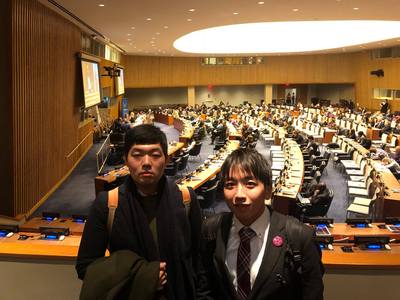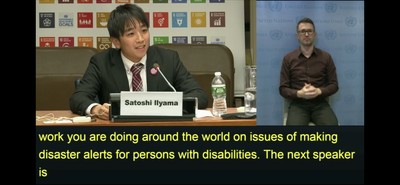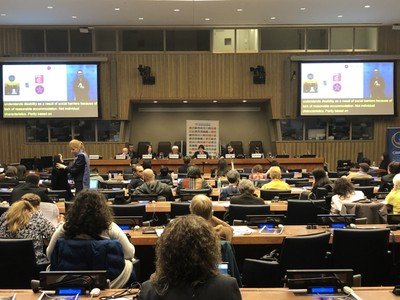TOPICS
- 2018
Kota Machida (B3), Department of Civil Engineering, presented innovation for disaster preparedness at UN Headquarters
Kota Machida (B3), Department of Civil Engineering, and Satoshi Iiyama (B3), School of Integrated Health Sciences, were invited by the United Nations (UN) to a panel discussion on “Persons with disabilities as agents of change: Lessons from disability-inclusive disaster risk reduction and humanitarian action for resilient and sustainable societies,” held at the UN Headquarters in New York on December 1, 2017, as representatives of youths, and introduced transformative activities of the University of Tokyo “EMPOWER Project” which aims at achieving Sustainable Development Goals (SDGs) through arts and culture.
The panel discussion was organised by the UN Department of Economic and Social Affairs and moderated by H.E. Ambassador Mr. Luis Gallegos, former Permanent Representative of Ecuador to the UN and ex-Chairman of the Ad Hoc Committee on a Comprehensive and Integral International Convention on the Protection and Promotion of the Rights and Dignity of Persons with Disabilities. Other participants included representatives from UNICEF, the World Bank Group, NGOs, among others. The panel discussion was live-broadcasted to the world.
[Movie (The presentation starts from 2:19:11): http://webtv.un.org/watch/part-1-transformation-towards-sustainable-and-resilient-society-for-all-observance-of-the-international-day-of-persons-with-disabilities-idpd-1-december-2017/5663572704001/]
The presentation introduced the “EMPOWER Project” (www.fb.com/UTempowerproject/) which is a global research and action project founded by professors and students of the University of Tokyo which aims at achieving SDG10 and promotes “coming out by supporters” through expressing his/her will to support others with an easy-to-find symbol “Magenta Star.” The project intends to promote accessibility of individual “attitude” and “behaviour” among individuals and communities, in addition to traditional “physical” accessibility in transportation systems and other infrastructures, in order to realise “leaving no one behind” in SDGs and “Omotenashi” for 2020 Olympic and Paralympic games. So far, coming out by those who want support such as pregnant women, persons with disabilities, older persons, and others through “Maternity Mark”, “Help Mark” etc., have been the standard practices in Japan. As an innovative addition to it, the Project promotes “coming out by supporters.” This has been useful for those who do not want to disclose their personal identities or conditions since it does not require coming out by those who want support, and also helpful for those who “want to offer support, but feeling shy to do so.” This can promote a culture of support and cooperation with respecting diversity as a positive enabler, and without labelling people, hence, would contribute to enhance resilience against disasters or other crises in communities.
The EMPOWER Project has been promoted by a student group “UNiTe” (www.fb.com/unite.sdgs/) which was established by students participated in the “UN and Culture” Intensive Seminar at UN organized by the Division of International Cooperation, Komaba Organization for Educational Excellence, College of Arts and Sciences, in cooperation with the Dentsu Diversity Lab.
 Kota Machida and Satoshi Iiyama
Kota Machida and Satoshi Iiyama
 Satoshi Iiyama speaking at United Nations headquarters
Satoshi Iiyama speaking at United Nations headquarters
 State of the panel discussion
State of the panel discussion

